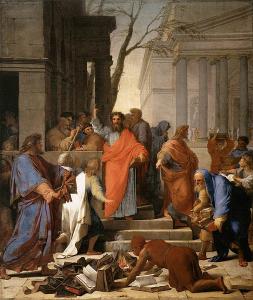This is the fourth post in a short series on the book of Acts, was written by a Christian colleague (JAG) who teaches in the School of Social Work. Both his professional expertise and his personal experience as a second generation immigrant shape his understanding of the book and bring insights that will help all of us read the book better. He presented the material in a well received class at our church and I am pleased to bring it here as well. RJS
One framework from Social Work that helps to differentiate the work of Philip from Paul is examining their respective levels of intervention, from the micro to the macro (Acts 8-28, especially 20).
A Personal Re-introduction: Membership has its Privileges
As the eldest son of Filipino immigrants, I am keenly aware of my educational privilege. I teach Social Work at not just any state university but at one implicated in the US colonization of the Philippines as “Our Little Brown Brother.” My cousin remarked, “You teach at a school that would not even admit me.”
Perhaps the biggest privilege is my opportunity to train tomorrow’s leaders. My proudest moment was visiting a former student on the mission field. I witnessed him implementing some of the strategies for community engagement not in a classroom but in the Southern Philippines, with the Tagakaulo, a remote mountain tribe. He showed me the phrase book his mission recently completed, a glossary of Tagakaulo terms, defining them next to their English, Tagalog, and Visayan translations. One of the older women praised the work – “Thank you for preserving our language and culture.”
Paul’s Farewell as a Social Work Pre-test?
 Philip is an evangelist, Paul a church planter. Although their roles overlap, in Social Work they could be considered examples of micro practice (interpersonal counseling) and macro practice (nonprofit management, community organization, policy and evaluation). For many years I supervised graduate interns, including international students who intended to establish nongovernmental organizations (NGOs) in their home countries. It occurred to me that I could assign Paul’s Farewell to Ephesian Elders (Acts 20:13-38) as a pre-test: What in the text might be helpful in your planning for an NGO?
Philip is an evangelist, Paul a church planter. Although their roles overlap, in Social Work they could be considered examples of micro practice (interpersonal counseling) and macro practice (nonprofit management, community organization, policy and evaluation). For many years I supervised graduate interns, including international students who intended to establish nongovernmental organizations (NGOs) in their home countries. It occurred to me that I could assign Paul’s Farewell to Ephesian Elders (Acts 20:13-38) as a pre-test: What in the text might be helpful in your planning for an NGO?
Hopefully the intern will identify some of Paul’s starting points. He personally recruited members for his NGO (through evangelism), an activity requiring interpersonal skills (Acts 20:18-21). Once recruited, it appears Paul selected some or leadership positions which included an intensive training program, likely on-the-job, extending over two years (Acts 19:10). In the case of the Ethiopian eunuch, however, the duration of Philip’s micro-intervention was brief (Acts 8:39).
The Elders seem to have specific roles and responsibilities related to the NGO’s continued function and it is clear the expectation is that the function continues after Paul departs (Acts 20:28). In Social Work, duration is a point of emphasis. On the micro level, it is unethical to keep a client in therapy with no specified end date. Is a dependence created which the therapist benefits from financially? In community practice, macro Social Workers also endeavor to work themselves out of a job.
Perhaps the intern will see that this is not a stand-alone NGO but rather one in a series of NGOs Paul has planted in cities throughout the Roman Empire, networked by his visits, correspondence, and transfer of material goods (notably the “Collection for the Saints” in Acts 20:1-5). Paul mentions Jerusalem explicitly in Acts 20:22.
The intern might recognize these observations as aspects of community organizing. Many consider Saul Alinsky the “Father of Community Organizing” and I mention him in most of my classes. In Jesus and Nonviolence: A Third Way, Walter Wink (2003) writes about “Jesus and Alinsky” but limits that analysis to the level of tactics, notably how “turn the other cheek” is a “Third Way” one Jew might resist an individual Roman soldier striking his face, as opposed to a broader discourse on strategy (chapter 3).
The intern’s homework: Research the NGO’s mission statement (Acts 1:8), then apply it to each of your observations. How does each align with the mission? Be specific.
Person-in-the-Environment: What about the Wolves?
Absent from my thought experiment thus far is any discussion of “wolves” (Acts 20:29) – not that this isn’t an important point, it just leads to a cluster of ideas beyond an intern’s pre-test.
First the wolves could be a number of possibilities. They could be literal. I fought the wild beasts at Ephesus might mean, like Samson (Judges 14:6) or David (1 Samuel 17:37), Paul fought a wild beast, perhaps a lion or bear.
They could be figurative. In the previous chapter, a stadium full of presumably Gentiles worshippers of Artemis (or at least those who saw their profits threatened by Paul’s teaching) are behaving like a wild, beastly mob (Acts 19:23-41).
They could be false teachers, the most dangerous of which seem to be former members of The Way, as often mentioned in Paul’s writings (and Acts 20:29-30) and also Revelation’s letters to the churches (Revelation 2-3).
They could also be the sub-grouping of Jews who seek to undermine Paul’s ministry, at times violently. One charge at Philippi is worth exploring further:
They brought them before the magistrates and said, “These men are Jews, and are throwing our city into an uproar 21 by advocating customs unlawful for us Romans to accept or practice.” (Acts 16:20-21)
A final Social Work concept I will introduce is PIE: Person In the Environment. In faculty meetings I’ve heard colleagues quip more than once that we stress too much person and not enough environment.
Paul’s environment is the Roman Empire. At the time, it was the world’s only Superpower. Indeed, Acts implies the Empire is a stand-in for the known world.
Paul benefits tremendously from that context. His missionary journeys take place during the roughly 200 year Pax Romana, a largely peaceful time when it was possible for someone to travel the trade routes between major cities in relative safety and security. Especially if that someone was a Roman citizen.
It should be noted that Paul’s right to a trial, and especially to appeal to Caesar (Acts 25:1-9), is singular among Christians mentioned in the New Testament. It is a privilege certainly not enjoyed by Jesus. In Jesus and the Disinherited, Howard Thurman (1949) adds:
He was of a minority but with majority privileges…protection guaranteed by the state respected by the minions of the state…was like a magic formula always available in emergencies. It is to the credit of the amazing power of Jesus Christ over the life of Paul that there is only one recorded instance in which he used this privilege. (pp 21-22)
At some point after invoking his Roman citizenship to extricate himself from a tense scene in Jerusalem (Acts 22:22-29), Paul realizes a way to more directly address the charge that The Way is illegal is to appeal to Caesar, the Empire’s supreme authority. If successful, Christians would have Rome’s protection from “wolves” throughout the Empire, and not just a single city. It should be noted that in Phillipi, the pro-Christian demonstration of imperial support (Acts 16:36-39) came only at Paul’s insistence.
In some respects, Paul’s appeal to Caesar is similar to how test cases are brought before the US Supreme Court. One macro-level strategy for a group affected by an unjust law is to use the law to change the law. Some important test cases include Korematsu v USA (Japanese Internment during World War II), Brown v Board of Education (Separate but Equal Schools), and Loving v Virginia (Interracial Marriage).
Like Moses and the Promised Land or Martin Luther King and racial equality, Paul doesn’t “get there with you.” However, one thing that ennobles test cases is when the plaintiff does not personally benefit from the outcome but raises the issue for the greater good.
History eventually proves Paul right. Christianity becomes the de facto official religion of the Roman Empire with Constantine. Perhaps this is what Peter sees dimly when he writes that some of Paul’s teachings are “hard to understand” (2 Peter 3:16). Whatever the case, I find Peter’s perspective on history is comforting (2 Peter 3:8).
But do not forget this one thing, dear friends: With the Lord a day is like a thousand years, and a thousand years are like a day.
Questions for Reflection
Review your reflections on “Are you engaged in service?” Now add to your considerations privilege, any advantages you gain automatically because of your membership in a particular group. In Acts, for example, Paul’s areas of privilege include Roman citizenship, as well as his formal and informal education.
- What changes, if any, have occurred since reflecting on this question earlier in this series?
- How would you describe the social issue your service is addressing? What would you say is your current level of intervention? Could the service be improved if your actions were broader, in scope or practice, and perhaps more collective?
- What resources or partnerships would be needed to affect a policy or common practice related to the issue, on a local, community, regional, state, national or global level? How might you prayerfully implement these change efforts?
If you would like to contact me directly you may do so at rjs4mail[at]att.net.
If interested you can subscribe to a full text feed of my posts at Musings on Science and Theology.















